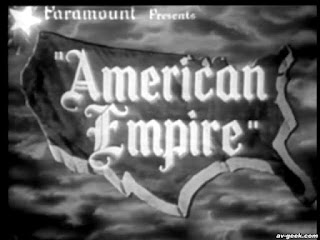The best I can say is that it is not so much a place, as a state of mind (credit to Chris Deliso for the phrase). Though historical analogies are perilous, tempting inappropriate parallels and interfering with rational analysis, they are nonetheless a sort of practical shorthand for describing modern phenomena. Today’s Empire to me is what is colloquially known as “The West,” and is not just the U.S. or the E.U., but both...From a distance of eight years, I can see a little better now. Though what I call the EUSSR is an adjunct of the Empire, a transnational-progressivist reiteration of the Soviet Union that bows to twelve yellow stars on a blue field instead of one on red, the actual Empire is headquartered in Washington. I've even taken to calling it the "Atlantic Empire" for the sake of precision, as it represents a continuation of the British Empire of yore in terms of geopolitical goals (if not quite ideology).
 |
| A 1942 movie about a cattle empire; irony deliberate |
That's precisely the "state of mind" I was talking about, though I didn't realize it then. Sure, EUrocrats try to change observable reality by twisting language and making up convoluted laws, but they stop short of rearranging reality at gunpoint - mostly because they have become squeamish about warfare. Americans don't have that "problem."
To people who share Rove's view of power - whether they call themselves Republicans, Democrats or something else - being an empire means one is no longer bound by anything. Not the Constitution, not natural or divine law, not language, and not even physical reality. Everything is just a function of the Nietzschean "will to power". If they want something, they take it, by whatever means are most expedient. They can make excuses afterwards, or in many cases not even bother. As one former UN GenSec wrote, they see "little need for diplomacy; power is enough."
Is it? Judging by the extent to which Imperial will has been thwarted by actual reality at every step, no, power isn't enough. Examples are legion, from Afghanistan and Iraq, to Empire's failure to impose its will in Bosnia, or fully crush Serbia, or compel the world to recognize "Kosovo" as an independent state.
A thousand years ago, the Viking king of England ordered his chair be set on a beach, and commanded the waves to halt. Obviously, they did not. According to chronicler Henry of Huntingdon (Historia Anglorum), Canute the Great then said, "Let all men know how empty and worthless is the power of kings, for there is none worthy of the name, but He whom heaven, earth, and sea obey by eternal laws."
Yet the way most people think today, Canute was a fool who really thought he could command the tide - thus missing the whole point of his little demonstration, intended to show the importance of reality to his sycophantic courtiers.
In ancient Rome, imperium meant "power to command" - i.e. state authority over the individual. Today, it denotes the belief that one state - the U.S. - has authority over the rest of the world. It is an idea the founders of America would have recoiled in horror from, recognizing it as the ancient sin of hubris. Yet there we have it.
Until the tide comes in, anyway.

1 comment:
The most ancient sin of HUBRIS is exactly what it is.
Vanity, arrogance - disconnection from the one and only Creator - and the obvious desire to BE gods themselves.
The tide is coming - of that much I am absolutely certain.
Post a Comment